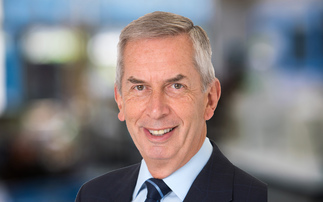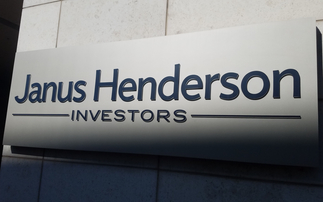After more than 30 years in fund management, Nichola Pease explains why she has switched her attention to bringing a more diversified range of talent into the industry, and why her family connections have not played as big a role as many may think in her career.
 "When I came into the City over 30 years ago, there was a much greater breadth of educational bandwidth. There was a view university gave you time to grow up and to develop your thinking. It didn't matter if you had done a History degree, Classics, or English."
"When I came into the City over 30 years ago, there was a much greater breadth of educational bandwidth. There was a view university gave you time to grow up and to develop your thinking. It didn't matter if you had done a History degree, Classics, or English."
Having held various senior roles at asset management companies since then, the young Nichola Pease initially had some misgivings about her career choice in the early days. She was among a group of eight picked from a thousand applicants, and one of the first female graduates, to join the Kleinwort Benson training scheme in 1983.
"I felt very uncertain. I thought they had picked the wrong person. But that, in a way, drove me on to try harder."
Pease is descended from a family with strong connections to the City - her father, Sir Richard Pease, comes from the Barclays family and was a vice chairman at the bank too, while brother Richard now works at Crux Asset Management having held roles at Henderson, New Star and Jupiter. She has been married to hedge fund manager Crispin Odey since 1991.
However, despite her family's background, Pease says that she has had to make her own opportunities in terms of her career.
"There was no expectation for me to go to university, let alone go into business. I can genuinely say that, on the way in, I don't think it gave me any opening at all," she explains.
She cites her student travel around Uganda, rather than her English Literature degree, as the reason why Kleinwort Benson hired her as a trainee over 30 years ago.
However, Pease is doubtful she would have been hired if she had been applying in today's environment. She says: "It was a less global world then, which meant there was less competition trying to get in.
"It still wasn't easy, but now I think it is really, really difficult."
Talent selection
This reflection has prompted Pease to turn her attention to the subject of recruitment in today's investment management industry.
While the numbers of applications have increased exponentially, the greater competition has actually made the selection process harder. The trend for the industry to hire very talented, but potentially identikit, graduates from a small pool of universities began to worry Pease.
"How do you sift?" she asks. "We can't meet everybody. The criteria became increasingly focused on whether the candidate was at the LSE or Oxbridge, or doing a very numerate degree subject."
Speaking to a friend, Andrew Formica, Australian chief executive of Henderson Global Investors, she discovered she was not alone in her concerns. Formica was of the opinion that investment groups had unintentionally "sleepwalked into narrowing the range".
"Andrew told me he had looked at his existing fund managers and asked himself whether they looked anything like the Mr and Mrs Perfect who were coming in. The answer was that they did not. And he said that really concerned him."
This sentiment chimed with Pease's own thinking as she believes attitude and aptitude to be as important as a degree.
Formica had already initiated a project at Henderson to attract a broader spectrum of trainees. It was called Investment 2020 and Pease decided she wanted to get involved. With her own university education in literature, she was an ideal figurehead.
"If you are doing top-end derivatives, I am sure it is incredibly useful to have a degree in maths or physics. But you do not need that for every job, and we benefit from having different ways of thinking within a firm," she says.
I was very aware about how I did my work and that it would not provide a bottleneck for anyone else because I was not there every day.
Positive discrimination
As one of the early senior female participators in the City, Pease might have been a victim of sexual discrimination. In fact, her experience has been the opposite and as a fund manager attending company visits, Pease often found herself sitting next to the most senior executive of the firm at the meeting.
Nowadays, Pease perceives there to be positive discrimination, with women mostly being invited to take non-executive positions to increase the diversity of company boards - although this can be a double-edged sword.
"You never want to be taken on just because you are female. You want to be taken on because you know you are going to be useful for the job. However, it makes companies more imaginative about giving people a break. The candidate might not have a picture-perfect CV but if they are a good thinker and they are going to bring something different to the job, then that is fine."
Pease could have been classed in that latter category when JO Hambro Capital Management was looking for its new chief executive.
After ten years at Smith New Court, where she had initially been hired to build up the European broking operation, she found she missed the stimulus of building out a business and was keen to take on that task at JO Hambro when the opportunity arose.
She was, however, pregnant with her third child. This may have been a cause for concern for some employers. Fortunately, the board at JO Hambro was sufficiently visionary to hire her.
There should not be too much legislation dictating how firms work - particularly given most MPs have not had commercial jobs. I do not think they are in the best position to start dictating how commercial firms should work.
Pease explains: "I had quite a good CV for the job I was going to. And so there was a trade - you are bringing some experience which the company does not have and you are gaining some flexibility."
With no staff and empty offices, Pease only needed to work three-day weeks at the start, which quickly increased to full time as the business grew. She ensured she was organised enough to do the work in the time given and to be available when required.
"I was very aware," she explains, "about how I did my work and that it would not provide a bottleneck for anyone else because I was not there every day. I do not think it ever slowed the business up in any way."
Pease is grateful for the flexibility she enjoyed at JO Hambro, where during her time at the firm assets under management grew from £200m to £7bn.
She believes women can work and raise a family simultaneously - and it can be done most successfully on a case-by-case basis. Legislating for a blanket solution is not the answer, however.
"There should not be too much legislation dictating how firms work - particularly given most MPs haven't had commercial jobs," she argues. "I do not think they are in the best position to start dictating how commercial firms should work."
If you are doing top-end derivatives, I am sure it is incredibly useful to have a degree in maths or physics. But you do not need that for every job.
Pastoral care
For Pease herself, getting the balance of equity ownership right between fund managers and shareholders has been one of the greatest tests during her career.
"I was always pro giving quite a lot away because I felt the fund managers were adding the value and it was sensible to align their interests with the company's."
Pastoral care for the fund managers was another consideration. Being responsible for investing other people's money is a high-pressure job and on occasion, psychoanalysts were brought in to help struggling managers.
She explains: "It is a lonely business when it is going wrong because, however much you lean out to somebody, ultimately they own that performance."
Support from colleagues, including herself as CEO, was vital in such circumstances. Most important of all was to contain any knee-jerk reactions and attempt to understand whether the underperformance was a short-term aberration or a longer-term trend.
"You cannot have a panic every time a manager has a bad time and it is very important for the managers to feel that support."
Nonetheless, if a manager consistently underperforms, alternative action might have to be taken, she admits.
"Being a fund manager is a very well-paid job. If they really have lost their touch, you have to be open and realistic about it," says Pease.
The feedback from the employers involved in Investment 2020 has shown some common themes and lack of entitlement is very attractive
Pease adds managing the managers can be a good deal easier if the right candidates are selected at the start. Simply picking up the manager of the moment without doing any due diligence can be "quite a dangerous way of doing it", she says.
Therefore, it is crucial that Investment 2020 focuses on attracting recruits to support functions, as well as asset management itself. As a portal, Investment 2020 provides access to the firms but does not dictate where to place trainees.
Pease is delighted to see that around 20% of placements have been in operations, around 12% in marketing, 12% in finance and just a little over that figure in risk.
And while economics degrees and MBAs appear to be a short cut to the top, other attributes can be as, or more, important. For example, enthusiasm is key to climbing the ladder, according to Pease: "What employers do not want to see are recruits who quibble about the work or positions they are given," she says.
Those who have achieved stellar academic success are particularly at risk from putting their own expectations ahead of the company's, she notes.
"The feedback from the employers involved in Investment 2020 has shown some common themes and lack of entitlement is very attractive," she says.
Opportunities arise from opportunities, she adds, explaining that luck can play a part, but "good attitude" is a greater factor.













